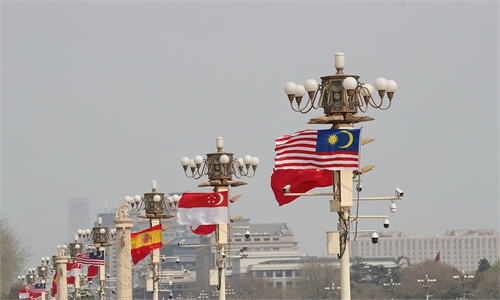
Illustration: Chen Xia/GT
Australia will hold the 2023 Quad summit in Sydney on May 24, the third leaders' meeting of the US, Japan, India and Australia. As a crucial part of the US "Indo-Pacific Strategy," the expansion of the Quad has received widespread attention, with Japan and ASEAN members being frequently mentioned as possible additions.However, White House press secretary Karine Jean-Pierre said at a daily press briefing on May 1 that "the Quad is still a relatively young partnership. There are no plans for new members at this time."
Southeast Asia is located at the center of the Indo-Pacific region, and this unique geographical position makes Southeast Asia geopolitically significant. ASEAN, as an association of nations, has elements of power with a coverage area of 4.49 million square kilometers, a population of 660 million, and a GDP of $3.35 trillion in 2021. Given ASEAN members have adopted the "ASEAN way" to deal with their internal affairs, its integration has continuously enhanced. Since the end of the Cold War, ASEAN has strengthened its ties with major powers, achieved rapid economic development, and increased its regional influence, thus gradually establishing its "centrality" in the regional affairs. Amid the US' growing strategic competition with China and the "Indo-Pacific Strategy," ASEAN's attitude and policy stance toward China and the US have been put under the spotlight.
The Biden administration released a new version of the US "Indo-Pacific Strategy" in February 2022, emphasizing enhanced coordination and cooperation with US allies and partners. Over the past year, the Biden administration has strengthened bilateral political and security cooperation relying on such treaty alliances. It has built new "mini-lateral" mechanisms among its allies and partners to carry out cooperation in terms of security, technology and trade, gradually forming the network of bilateral alliances in the Asia-Pacific region, such as the Quad, AUKUS, the US-India Critical and Emerging Technologies Initiative, Chip 4, the Blue Pacific Partnership and so forth.
In the "Indo-Pacific Strategy," the US attaches great importance to cooperation with ASEAN members. In the political sphere, the Biden administration continues to hold the US-ASEAN Summit. It upgraded the US-ASEAN relationship to a comprehensive strategic partnership in 2022. On the economic front, the Biden administration invited several ASEAN members to join the Indo-Pacific Economic Framework. In the security field, the US has boosted military cooperation with the Philippines, holding large-scale joint military exercises and sending the US Coast Guard to Southeast Asian countries along the South China Sea.
These US practices are intended not only to strengthen relations with ASEAN, but also to drive a wedge between China and ASEAN.
In recent years, as China's strength and influence increased, its relationship with ASEAN has become closer. The year 2021 marked the 30th anniversary of establishing dialogue relations between China and ASEAN, and in November 2021, China and ASEAN agreed to elevate their ties to a comprehensive strategic partnership. In the economic and trade fields, China and ASEAN have signed the China-ASEAN Free Trade Agreement and its upgrade, and China's imports and exports to ASEAN came to 6.52 trillion yuan ($970 billion) in 2022. In the security field, China and ASEAN signed the Declaration on the Conduct of Parties in the South China Sea and worked toward achieving the Code of Conduct. The two sides also provided mutual assistance during the COVID-19 pandemic.
This indicates that ASEAN is carrying out a balanced diplomacy toward China and the US while maintaining close ties with both countries in various fields. This has already brought and will continue to bring huge benefits to ASEAN from both major powers, attracting ASEAN with realistic interests and making it unwilling to disrupt this balance and harm its own interests.
Although ASEAN has a certain economic strength, it's only a part of its comprehensive strength. As an international organization, ASEAN cannot be compared with a single country, let alone the economic strength and comprehensive national strength of China and the US. In other words, if ASEAN takes sides between China and the US, it will inevitably worsen its relationship with the other, and the strength of either China or the US is strong enough to make ASEAN pay an unbearable price for it. This will remind ASEAN that it cannot take sides as it poses potential risks and costs.
For example, although the Philippines has been strengthening military cooperation with the US recently, it still maintains its relationship with China proactively, highlights the separation of the South China Sea dispute and bilateral relations, and repeatedly emphasizes that the US can't use military bases in the Philippines for "offensive action" against China in the event of a future war over Taiwan.
In addition, it should be noted that, in reality, international relations cannot achieve a perfect state of idealism. ASEAN cannot achieve a 100 percent "balance" between China and the US, nor should China and the US expect ASEAN to cut off cooperation with the other completely. For example, ASEAN's participation in "multi-lateral" mechanisms led by the US does not mean that ASEAN is "standing with" the US, but it depends on whether the content and methods of their cooperation harm China's national interests.
Similarly, China's joint military exercises with Singapore cannot indicate that Singapore, an important security partner of the US, has "abandoned" military cooperation with the US or "embraced" China.
The author is an associate research fellow with the National Institute of International Strategy at the Chinese Academy of Social Sciences. opinion@globaltimes.com.cn

